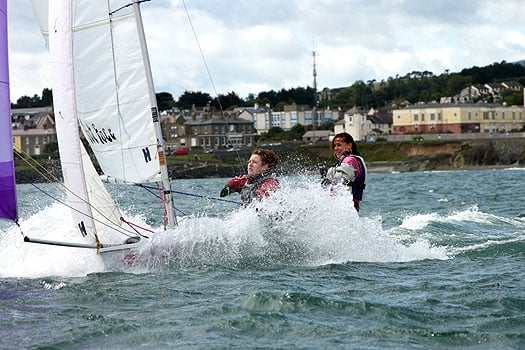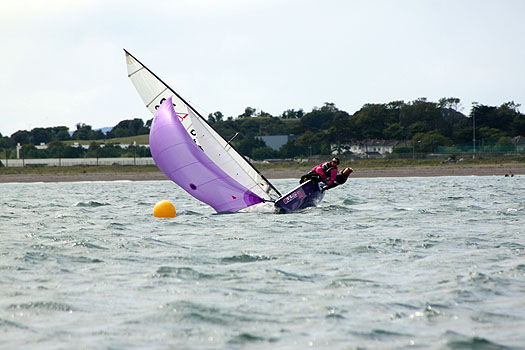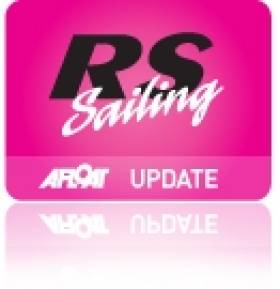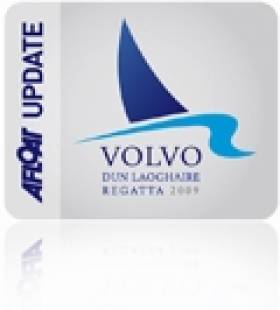Displaying items by tag: Ciara
RS 200: the 'ideal' next step for Irish Youth Sailing?
Questions over the next step for juniors after the RS Feva point to the bigger RS200 writes Feva sailor Ciara Byrne
The RSFeva has become the world's best selling two-person dinghy in recent years with fleets also growing in clubs all over Ireland. It is fast becoming the most popular and widespread choice for teenagers and youth sailors who enjoy competitive, active and exciting sailing.
However many questions were being asked recently at the RSFeva Nationals, held in Crosshaven, Co. Cork, regarding the next step for young, talented sailors who wish to continue racing in large fleets without the difficult transition of transferring from the Feva into a larger, unfamiliar dinghy. This uncertainty has led to many sailors dropping out of sailing altogether, while the remainder have split the fleet into Lasers, the 420/470 or moved on to cruisers.
However these dinghies require a lot of time and effort of getting used to, leaving some sailors frustrated and also, less motivated. To avoid this altogether, there is one simple solution: the RS200.
The RS200 is a spacious, one-design, double-handed, hiking, high-performance dinghy which has developed a huge following at club, circuit and championship level in the UK with a growing fleet in Ireland. A pivoting centreboard and rudder allow easy launch and recovery with a thwart giving the crew a comfortable position for light winds. With the asymmetric spinnaker, similar rigging and a similar design, it can be considered as a larger and faster Feva which makes for an easy changeover and the most logical and simple step up.
The ideal weight for an RS200 is 115-145kg (18-23 stone) which allows people of all ages to sail and race effectively in this dinghy. Ideal for teenagers emerging from the Feva, parents, youths, couples, friends and relatives can also come together which enhances the family and social scene.
Even though the 420 has a larger total sail area, the RS200's asymmetric spinnaker of over eight square metres, with a smoother single line hoist and drop system, similar to the Feva's. makes for a faster boat and requires greater tactical and more exciting downwind sailing. This encourages competitive racing and enhanced racing skills.

An RS200 at full speed off Greystones. Photo: Fiachra Etchingham
A maintenance free hull, made of lightweight polyester GRP ensures a long competitive life and second hand boats can be in very good condition so that older hulls are without the disadvantage experienced in fleets such as the 420. Furthermore, every hull comes from the same manufacturer giving no subtle advantage to any one boat; therefore racing just comes down to the sailors' tactics, boat handling and general knowledge of sailing and racing.
While the RS200 is not an Olympic class, there are large UK and Irish fleets which are active and competitive. Johnathan Lewis, a UK Feva coach and RS200 sailor, strongly encourages Feva graduates to move into the RS200 as it is an easy transition and makes for fun and exciting sailing. RS200 fleets are strong in Irish clubs such as those in Northern Ireland including Ballyholme, Newcastle and Cushendall as well as Greystones Sailing Club in Co. Wicklow.
Greystones Sailing Club boasts probably the largest asymmetric dinghy fleet in Ireland with fifty five asymmetric dinghies, twenty one of those being RSFevas and the majority of the remainder being RS200s. Recognising the RS200 as the natural progression from the Feva, ages range from fifteen to fifty five across the RS200 and RS400 fleets in the Club, with most of these boats competing in national events in Ireland, and some in the UK and further afield.

Rounding a mark in the RS200. Photo: Fiachra Etchingham
As fleets build in Dún Laoghaire and Howth yacht clubs, the RS200 is gradually becoming a popular progression from the Feva, and with the RS400 as a follow on boat for larger crews, young sailors can remain involved and spirited in asymmetric racing. The RS200 satisfies a thirst for speed and pace which generates more exciting, competitive and enjoyable sailing for those emerging from Feva fleet.
A Dublin Sailor (who has asked not to be named) has sent us comments on this story:
As one involved in junior and youth sailing at club level, one of the big decisions that faces youths is where to go after junior classes such as Optimists, Toppers, Fevas. Like any other sport, there is a high attrition rate after the age of 14 / 15, especially among girls which is an even greater shame as they can compete on a par with the guys.We need a class that will keep youths engaged. The 420 & 29er are great boats but require higher levels of boathandling, are much more competitive and tend to attract the top sailors. They also suffer from an inability to match up crews who will stick together - teenagers chop and change all the time and its difficult to race a boat like a 420 / Fireball / 29er wihout a constant crew partnership.
We need a boat/class that:
- Enables swapping around of crews without a major impact on the boathandling / teamwork. A sailor's plans for the weekend / event / season are not scuppered because of crewing issues.
- Does not need a highly competent crew (e.g. ability to trapeze and fly / gybe a kite etc.) so that sailors can sail with their mates who may not necessarily be top-notch sailors but who can acquit themselves well in a slightly less complex boat.
- Has a good mixed social scene which is the most important element of any class, youth or otherwise.
- Does not cost the earth in terms of purchase price, is easy on wear & tear on kit (hence replacement & upgrade costs) or does not go soft and become uncompetitive needing a new hull after three to five years etc
- Has international competition that is closeby (UK, FR, Bel, Ned etc) for those aspiring to a bit more
- Has a motiviated class structure to help grow the class.
The fear is that we are starting out another class that will dilute the current youth class efforts. However I believe that the 420 and 29er will hold their own and continue to attract top sailors with ISAF ambitions.
On the other hand, if we continue to support these we will continue to lose the middle ground (and majority) of young sailors from our sport. Youths are fickle enough and if its too much hassle to deal with all the challenges of getting afloat they just won't bother - sad but true.
The ISA needs to take a lead in this and while its Olympic ambitions are great to see, it will fail the sport as a whole if it does not tackle this gaping need in its portfolio of support.
I believe that the RS200 and R2400 provide the best solution to these challenges. They appear well-built and the manufacturer certainly appears well organised and gets involved.
Looking from outside and without any vested interests (other than the health of junior and youth sailing) the RS's get my vote as a class that can make a radical difference.
Irish Sea Events Offer Entry Discounts
"The way this works is that the Clyde Cruising Club are offering a 25% rebate for boats from the 4 Dun Laoghaire Clubs (DMYC, NYC, RIYC, RStGYC) that enter the Brewin Dolphin Scottish series before the expiration of the early bird discount period which expires on April 22nd explained Dun Laoghaire event secretary, Ciara Dowling.
As a reciprocal arrangement the committee of the Volvo Dun Laoghaire Regatta are offering a discount of 50% from the full entry fee to all boats that enter both regattas. To avail of this, boats must register for the early bird entry fee in the Volvo Dun Laoghaire Regatta prior to 2 May 2011. Note the 50% discount will be applied to the full entry fee rate and not the early bird rate.
To avail of this arrangement for the Scottish Series contact the Brewin Dolphin Scottish Series office for details, [email protected] 0044141 221 2774.
To avail of this arrangement for the Volvo Dun Laoghaire regatta visit the event website at www.dlregatta.org or email [email protected]
The Scottish Series takes place from 27–30 May and the Dun Laoghaire regatta from July 7th–10th 2011.
In a further boost for Dun Laoghaire sailors heading north the feeder race from Bangor to Tarbert has been re-instated.
Troon and Largs Marinas are offering competitors berthing rate discounts around Scottish Series.
Competitors from Scotland coming to Dun Laoghaire are reminded that the entry fee to the regatta includes free berthing for the duration of the event.
The official Notice of Race and Online Entry are now available at www.dlregatta.org

























































